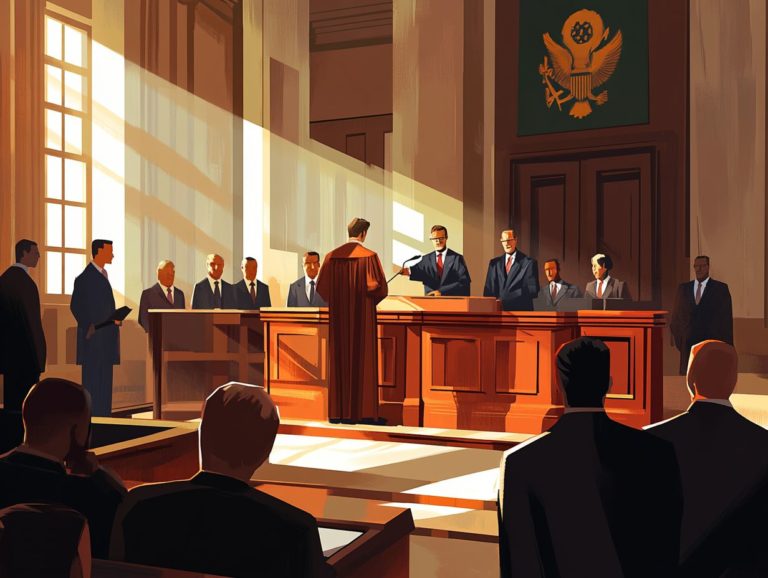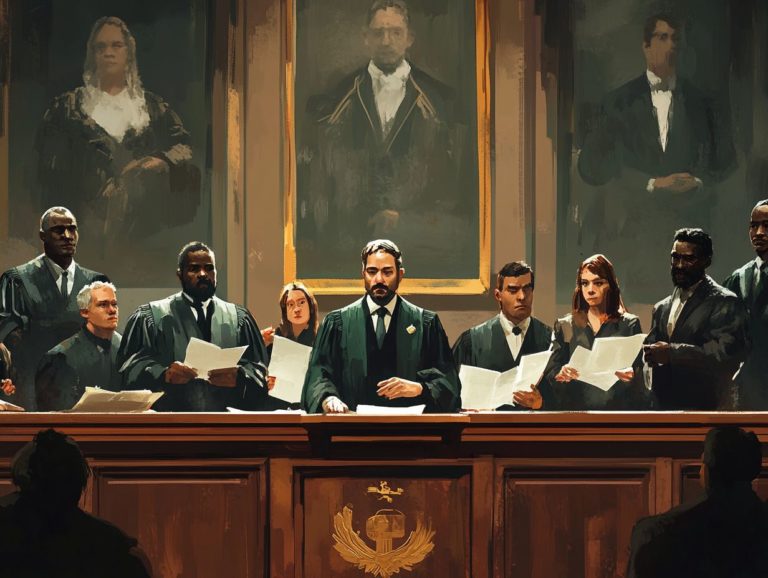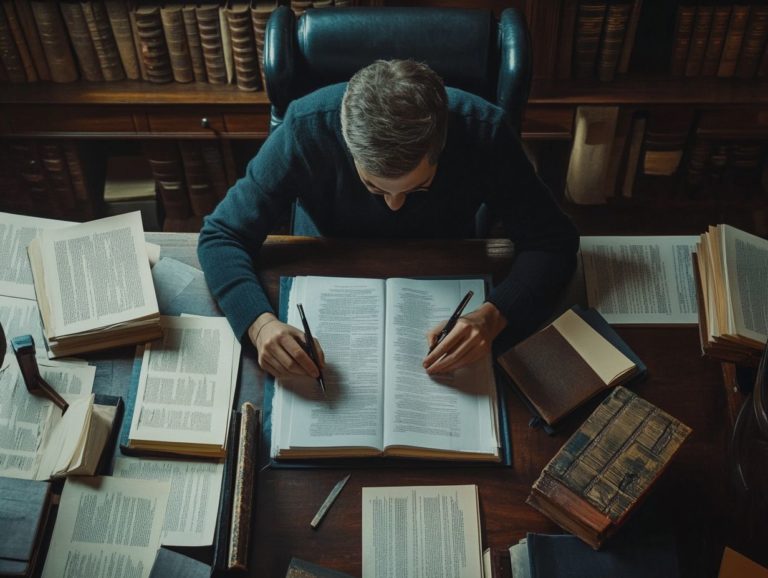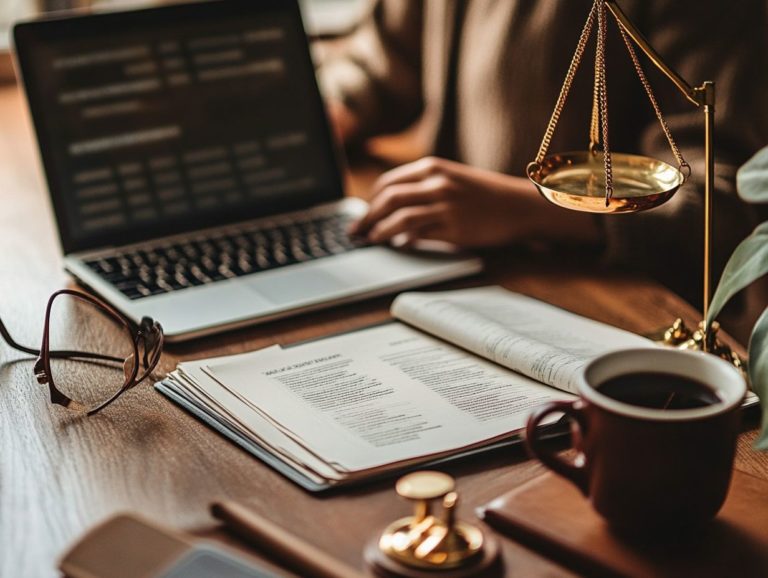What Is a Public Defender?
Public defenders are essential players in the criminal justice system, offering legal representation to individuals who cannot afford to hire private attorneys. This article reveals the crucial role public defenders play in justice!
You will explore how public defenders differ from private attorneys, the process for securing their services, and the distinct challenges they encounter in their work. It also looks ahead at potential changes that could enhance this indispensable service.
Immerse yourself in the intricate world of public defenders and discover their profound impact on justice.
Contents
Key Takeaways:

Public defenders play a crucial role in the criminal justice system by providing legal representation to individuals who cannot afford a private attorney. Their services are essential in protecting the rights of defendants and ensuring fair trials for all individuals, regardless of their financial situation. Despite facing challenges, public defenders are dedicated advocates, making a real impact in the justice system.
Understanding the Role of a Public Defender
The role of a public defender is essential in ensuring that people who cannot afford legal help receive high-quality representation in criminal cases, upholding their rights under the law.
Public defenders serve as appointed counsel within the judicial system, representing clients in both felony and misdemeanor trials. This commitment ensures that everyone has access to effective legal counsel.
Definition and Responsibilities
A public defender is a lawyer appointed by the court to provide legal representation to defendants who cannot afford to hire their own attorney, ensuring fair judicial representation for all.
These legal professionals handle a wide range of responsibilities that go beyond simply appearing in court. They prepare their cases meticulously, gathering evidence, interviewing witnesses, and analyzing legal documents to build strong defenses.
Beyond trial duties, public defenders manage cases by coordinating with social services and investigators to address various aspects of a defendant’s situation. Their commitment doesn t end with a verdict; they also play a crucial role in the appeal process, advocating for their clients when challenging unfavorable decisions.
Through their dedication, public defenders uphold the fundamental rights of individuals, ensuring that everyone receives the legal support they deserve, regardless of their financial circumstances.
The Importance of Public Defenders
Public defenders hold a pivotal position in the judicial system, safeguarding the rights of defendants and ensuring that justice is accessible to those who might otherwise be deprived of legal support.
They advocate for rehabilitation over punishment, embodying a commitment to fairness and restorative justice principles.
Protecting the Rights of Defendants
Public defenders play a vital role in safeguarding constitutional rights, ensuring that all individuals, including minors, receive competent legal representation while maintaining the sanctity of attorney-client privilege throughout the legal process.
These dedicated professionals work tirelessly in the complexities of the legal system, providing essential services from offering counsel during interrogations to mounting vigorous defenses in court.
By doing so, they help level the playing field for individuals who may lack the financial resources to hire private attorneys. Upholding attorney-client privilege fosters trust, allowing clients to share sensitive information without fear of repercussions.
This confidentiality not only strengthens the integrity of the legal process but also plays a crucial role in securing fair trials and protecting the rights of the accused.
How Public Defenders Differ From Private Attorneys

Public defenders and private attorneys differ significantly in terms of funding and clientele.
Public defenders are appointed to represent individuals who lack the financial means to secure legal counsel, ensuring that justice is accessible to all.
In contrast, private attorneys are usually retained by clients who can afford to pay for their legal services. This reflects a more individualized approach to legal representation.
Key Differences in Services and Resources
Public defender services frequently encounter daunting challenges. Overwhelming caseloads leave less time for effective case management and courtroom representation.
Private attorneys typically boast greater resources. This disparity in resources affects the quality of legal defense available to individuals accused of crimes.
Public defenders often juggle numerous cases at once. This restricts their ability to conduct thorough investigations, prepare effective defenses, or maintain meaningful communication with their clients.
As a result, the outcomes for defendants represented by public defenders may be less favorable. They often face longer sentences or higher rates of conviction.
In contrast, private attorneys have the capacity to devote more time and attention to each client. This enhances their strategic approach and ultimately improves the effectiveness of the defense.
This imbalance raises serious concerns about equitable access to justice for all individuals, irrespective of their financial circumstances.
The Process of Obtaining a Public Defender
To obtain a public defender, you ll need to meet certain eligibility criteria. You must fill out an application and provide a document showing that you can t afford a lawyer.
This document illustrates your inability to afford legal counsel.
Eligibility Requirements and Application Process
To qualify for a public defender, you need to meet certain eligibility requirements. This typically involves demonstrating your financial situation to show that hiring a private attorney isn t feasible.
You will have to provide documentation of your income, expenses, and overall financial standing. This allows the court to assess whether your need for assistance is genuine.
Once you believe you meet the criteria, submit an application through your local court or the public defender’s office. The staff will carefully review your information.
If your financial situation improves, you may need to pay back for the legal services you received. This helps ensure that resources remain available for others in similar situations.
Challenges Faced by Public Defenders
As a public defender, you encounter a multitude of challenges within the criminal justice system. High caseloads create a demanding environment.
Limited resources can significantly impede your ability to provide the effective representation that your clients deserve.
Overcoming Obstacles in the Criminal Justice System
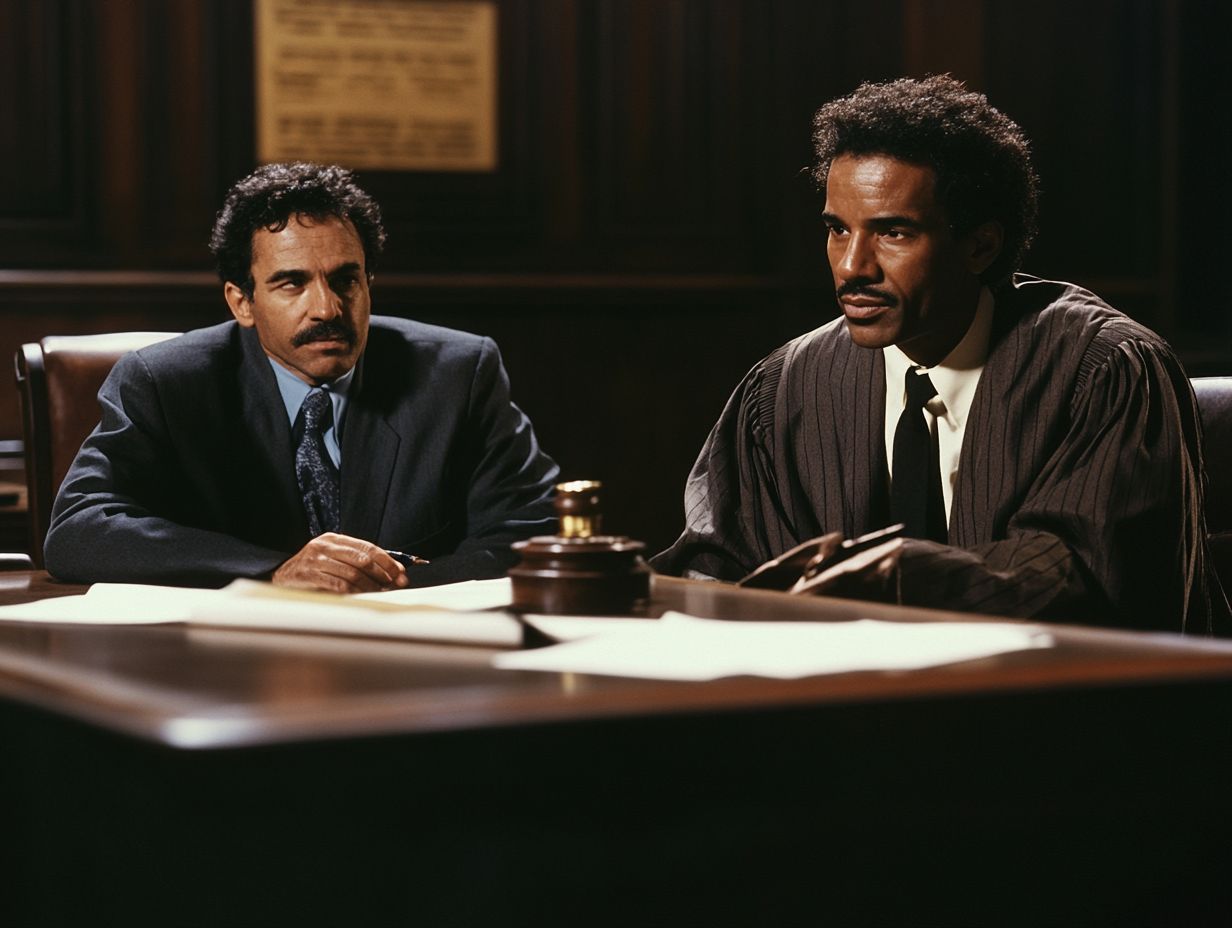
Despite the challenges in the criminal justice system, public defenders are committed to overcoming obstacles. They advocate for rehabilitation and develop effective legal strategies tailored to serve your best interests.
They cultivate strong relationships with clients, allowing them to grasp the unique circumstances clients face. By working closely with support staff, including investigators and social workers, they develop comprehensive defense strategies.
This collaborative approach enhances the quality of representation you receive. It underscores the essential principle of upholding your rights, ensuring that you are treated fairly in an often intimidating legal landscape.
The Future of Public Defenders
The future of public defenders is on the brink of transformation! Potential changes and improvements are on the horizon, designed to elevate legal services and ensure enhanced access to justice for all defendants.
This is particularly significant for those who require affordable legal representation. As these advancements unfold, you can expect a more robust support system that safeguards the rights of individuals who might otherwise struggle to navigate the legal landscape.
Changes and Improvements in the Field
Changes and improvements in the realm of public defense could significantly enhance your practice. Imagine increased funding and enhanced training for public defenders. The rollout of assistance programs specifically designed to strengthen legal representation for low-income defendants is also on the table.
By cultivating partnerships with legal aid offices, you can access additional resources and expertise that may lead to better case outcomes for your clients. Community support initiatives, such as mentorship programs or local advocacy groups, are crucial in shaping a more equitable justice system.
Collaborative efforts empower you as a defender and ensure that defendants receive comprehensive support from legal advice to emotional guidance creating an environment where access to justice becomes a collective community responsibility.
Frequently Asked Questions
What is a Public Defender?
A public defender is a lawyer who provides legal representation to individuals who are unable to afford a private attorney. They are appointed or assigned by the court to represent defendants in criminal cases. This helps ensure that those who cannot afford a lawyer have access to legal support.
How is a Public Defender different from a private attorney?
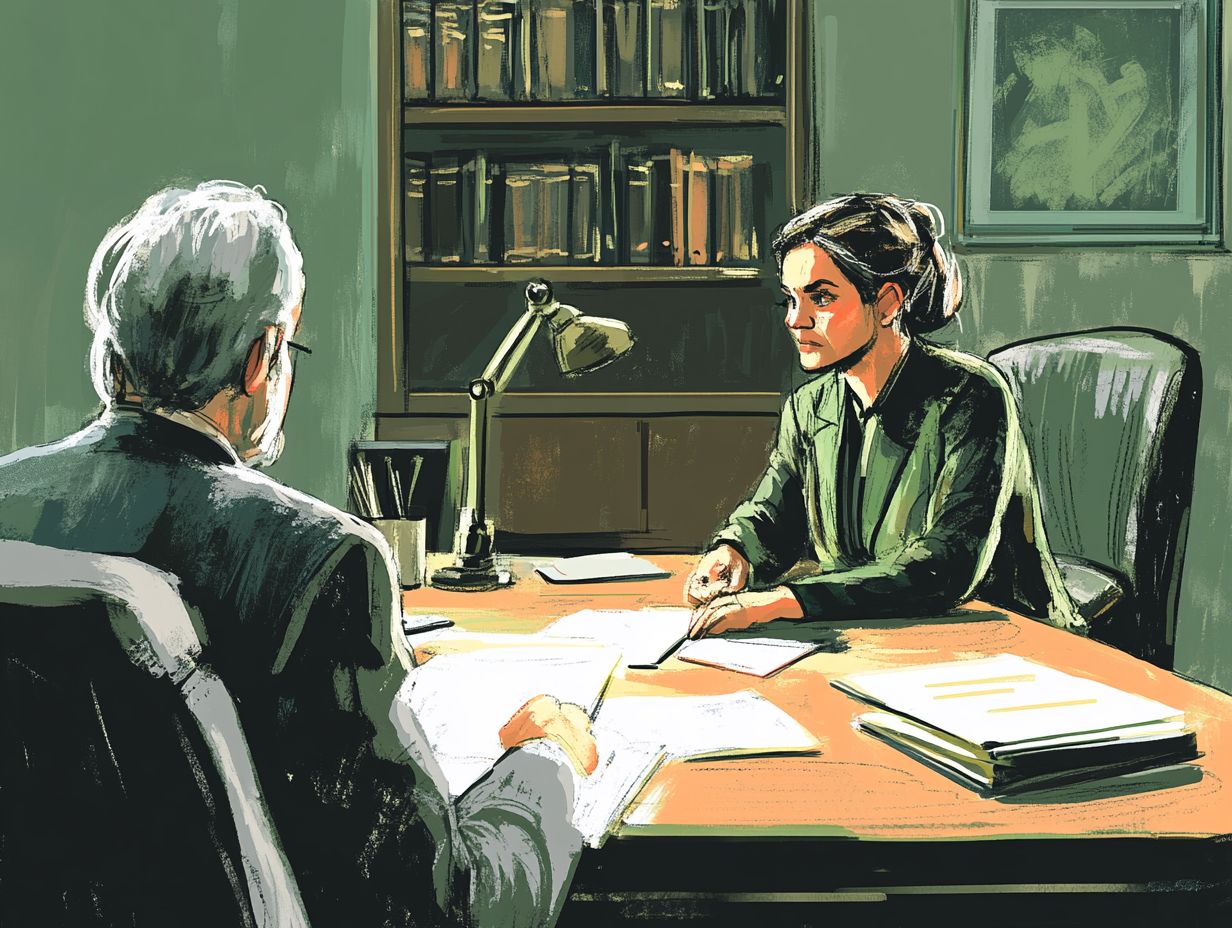
Public defenders are employed by the state or local government, while private attorneys are hired and paid for by the client. Public defenders often manage a heavier caseload and have fewer resources compared to private attorneys.
Who qualifies for a Public Defender?
Individuals who are facing criminal charges and cannot afford a private attorney may qualify for a public defender. Eligibility usually depends on the defendant’s income level and financial resources.
Can I choose my own Public Defender?
No, public defenders are assigned by the court and cannot be chosen by the defendant. However, if the defendant is not satisfied with their assigned public defender, they can request a new one.
Are Public Defenders as good as private attorneys?
Yes, public defenders are just as qualified and knowledgeable as private attorneys. They have the same legal training and experience and are dedicated to providing the best representation for their clients.
Do I have to pay for a Public Defender’s services?
No, public defenders are provided free of charge to those who qualify. However, depending on the case, the defendant may have to pay certain fees such as court costs or fines.
Stay informed about your rights and options!



